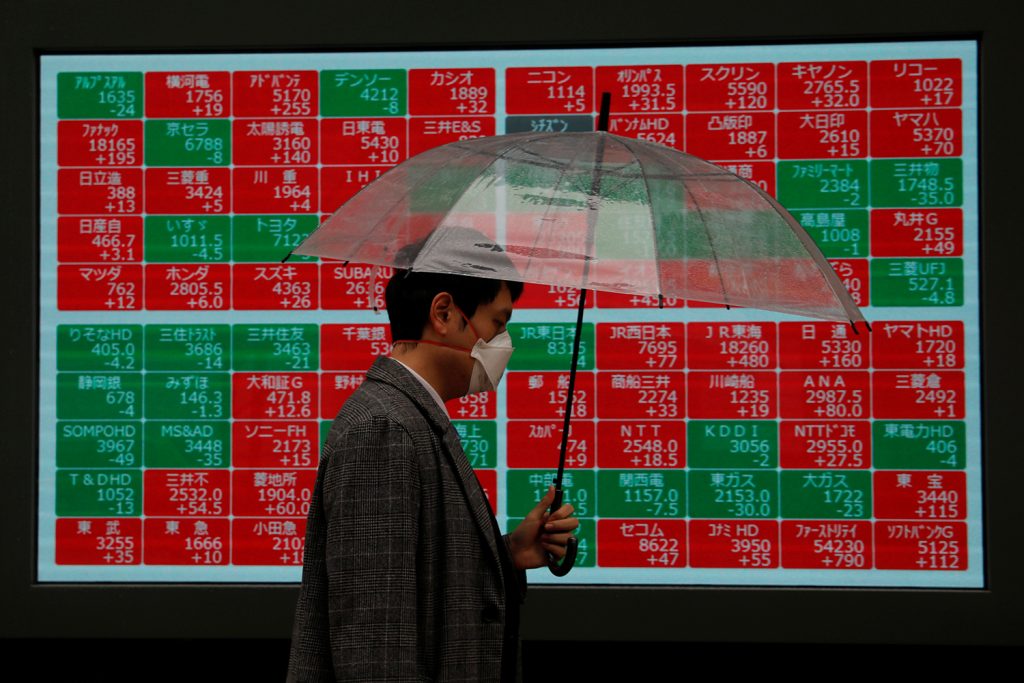EQUITIES
Shares in Asia-Pacific fell sharply on Monday, with Chinese indexes led losses. European markets also are set to fall at the open.
The Shanghai composite declined 4.31% in the afternoon, and Hong Kong’s Hang Seng index fell 3.66%. Japan’s Nikkei 225′s slipped 1.90%, the South Korea’s KOSPI traded 1.76% lower, and Singapore’s FTSE Straits Times index dipped 0.44%.
Australia and New Zealand markets are closed for a holiday.
European stocks are expected to open sharply lower on Monday. Investors in Europe will be digesting the projected result of the French presidential election on Monday and monitoring the latest developments in Ukraine. France’s Emmanuel Macron looks set to have comfortably beaten his rival Marine Le Pen in Sunday’s election, securing a second term as president on his pro-business and pro-EU agenda.
OIL
Oil prices extended losses on Monday as China continued lockdowns in Shanghai and investors prepared for a series of U.S. rate hikes.
Brent crude futures dropped to a two-week low of $102.43 a barrel. U.S. crude futures fell below $100 mark to $98.05 a barrel.
CURRENCIES
The dollar climbed as investors sought safety due to uncertainties over the global growth outlook. The U.S. dollar index, which tracks the greenback against a basket of its peers, was at 101.707 on Monday, near its highest in two years scaled in the previous session.
U.S. 10-year Treasury yields, however, were off recent highs. It was at 2.847%, while the 2-yr yield off last week's highs at 2.6399%.
Bitcoin fell below $40,000 mark.
GOLD
Gold prices edged lower on Monday, near their lowest level in two weeks touched in the previous session as elevated dollar continued to pressure demand for greenback-priced bullion.
Spot gold was down 0.76% at $1,917.70 per ounce. U.S. gold futures were down 0.87% at $1,917.50.
Spot silver dipped 0.2% to $24.10 per ounce, platinum eased 0.2% to $928.77 and palladium fell 2.3% to $2,319.78.
ECONOMIC OUTLOOK
Asian stocks fell sharply on Monday as concern about whether the U.S. and global economy can withstand an increasingly hawkish Federal Reserve and worries about Chinese growth due to lockdowns to prevent the spread of COVID-19 rattled investors.
U.S. Federal Reserve chair Jerome Powell endorsed a 50-bp increase next month and at least one more such move, outlining his most bold approach yet to reining in surging prices. Stronger tightening signals from the European Central Bank are also undermining risk appetite.
China ordered mandatory COVID-19 tests in a district of Beijing and locked down some areas of the capital as policymakers raced to prevent a repeat of the outbreak that’s hobbled Shanghai for weeks.
Russia-Ukraine war, China’s worsening COVID-19 situation and the potential for more aggressive interest-rate increases pulled the commodities down. Copper and iron ore fell in Asia, though soybean oil jumped after an Indonesian ban on palm oil export.
The euro found support after Emmanuel Macron won a second term as French president. Macron comfortably saw off a far-right challenge, reassuring markets about France's commitment to an integrated Europe.
Chinese telecommunications company ZTE will report earnings on Monday, followed by earnings reports by Europe’s Deutsche Boerse, Philips and Roche.
The week ahead is headlined by U.S. growth data due on Thursday, European inflation figures on Friday and a monetary policy meeting for the Bank of Japan.
Investors are facing a potentially painful stretch in the weeks ahead, as a hawkish Fed, rising bond yields, geopolitical uncertainty, and the corporate earnings season fuel investor unease.













